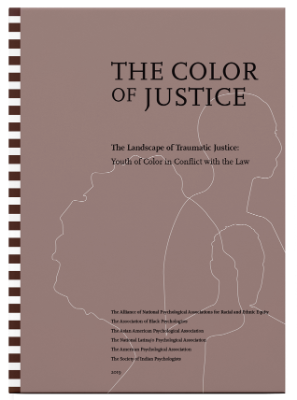The Color of Justice—The Landscape of Traumatic Justice:
Youth of Color in Conflict with the Law
Youth of color are underserved and overrepresented at all stages of the juvenile justice process — due in part to a lack of access to culturally appropriate assessments and mental health services. They are disproportionately arrested, referred to juvenile court, prosecuted, detained, and sentenced to secure confinement. We are failing them in both prevention and treatment. We need a better way of thinking about what is needed, what is missing, and what is problematic in mental health services for youth of color (YOC) who are in conflict with the law. A better way would recognize the following and more.
- The limited provision of mental health care for youth of color is in stark contrast to the high frequency of punitive sanctions imposed in response to psychiatric and behavioral problems.
- What resonates with culture, values and social norms of communities of color does not necessarily follow current practice in Western mental health treatment.
- Among historically oppressed people of color, historical trauma is equivalent to soul wounding. In other words, the core of one’s humanity and existence is assaulted. Among system involved youth these wounds are compounded under current practices.
- Respecting culture and emphasizing the value and necessity of its inclusion in designing, describing, implementing and evaluating intervention and prevention strategies can notably shift the way in which mental health can serve youth of color and protect them from unnecessary entanglement in conditions of juvenile detention.
The Alliance of National Psychological Associations for Racial and Ethnic Equity (The Association of Black Psychologists, The Asian American Psychological Association, The National Latina/o Psychological Association, The American Psychological Association, and in collaboration with The Society of Indian Psychologists) have co-authored The Color of Justice: The Landscape of Traumatic Justice—Youth of Color in Conflict with the Law. This report explores how the field of psychology and the mental health system, including inadequacies and failures in prevention, early intervention, and treatment contribute to the problem of over-representation. The report provides: (1) personal stories from youth entangled in the juvenile justice system and their attempts to interact with, navigate, cope, and even heal from traumatic experiences with the system, (2) evidence that something is terribly wrong in this system that plods on, uninterrupted, (3) an analysis of issues related to context, race, and culture; (4) a critique of the psychology and the mental health system’s complicity with the JJ system’s approach with YOC, and (5) ideas about the way forward.
Join the conversation at #justiceyouthofcolor
